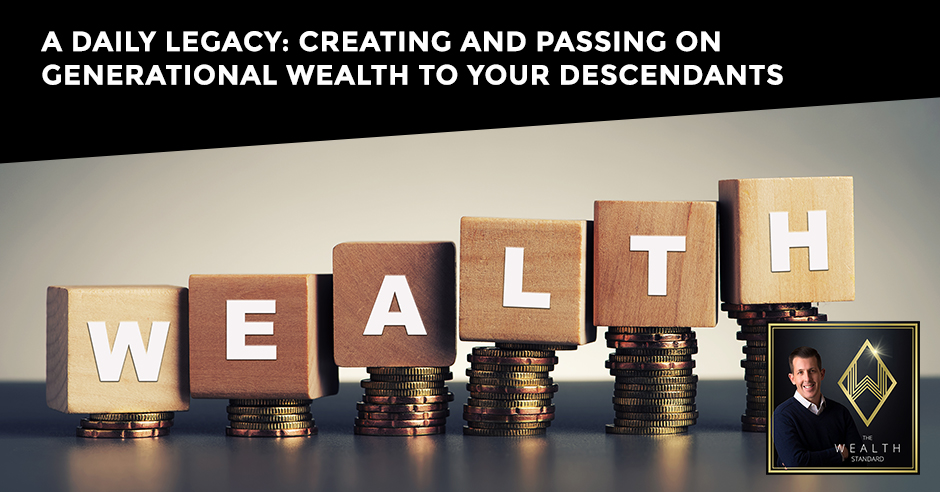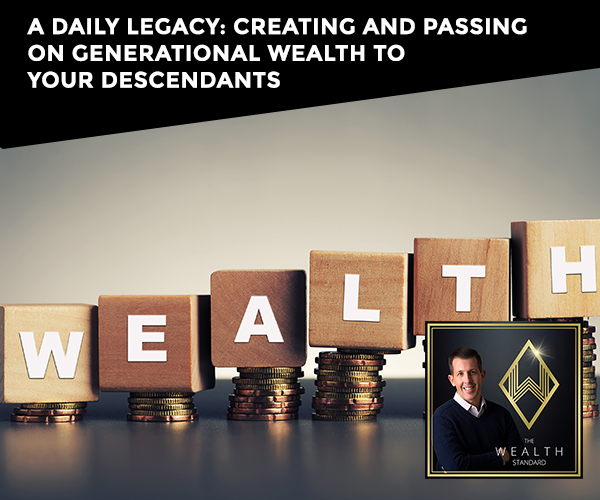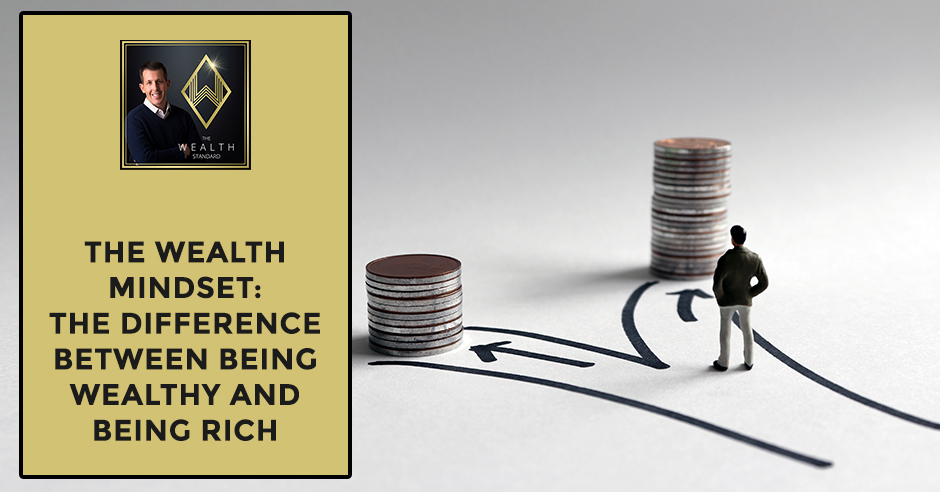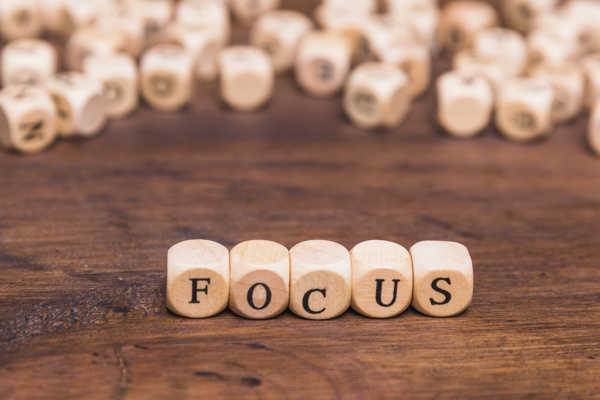A Daily Legacy: Creating And Passing On Generational Wealth To Your Descendants
Podcast: Play in new window | Download

What is the greatest obstacle that is preventing you from living a life at the next level? For many people, it’s creating and passing on generational wealth. There are many ways to be financially free, but how do you enable your children and their children after them to have the same freedom? What does wealth mean for you in the first place anyway? Patrick Donohoe unpacks this for us in this special episode of The Wealth Standard.
—
Watch the episode here:
Listen to the podcast here:
A Daily Legacy: Creating And Passing On Generational Wealth To Your Descendants
I hope you are in a festive mood despite the shutdown circumstances. I hope you have an amazing holiday and enjoy yourselves and enjoy the season. Welcome to this episode. I’m going to be speaking about generational wealth. Many of I sent out a survey in order to get feedback, insights and ideas about how to create a digital course that would be meaningful to you. I have completed that. If you go to Go.TheWealthStandard.com/freedom, you can purchase that. It is version one, I’m going to be doing some live Q and A sessions and getting direct feedback about some of the things I came up with in order to refine and improve, iterate and so forth. It’s exciting.
In the responses that I got, there are some common themes. That’s what I have been addressing in the episodes. I’m going to be doing that. The question I’m mostly getting into, which was in the survey, is what’s standing in the way? What’s the greatest obstacle that is preventing you from living a life at the next level? It’s obviously very broad but it’s been cool to read through the responses. This is one that I felt was important to address given the season but also given some things that I know that are on my client’s mind, my mind specifically. I hope they’re on your mind as well, especially if you have children even if you don’t, it doesn’t matter. It could be grandchildren, it could be nieces and nephews. It could be people in general, frankly. Let’s unpack the idea of generational wealth. Thanks for joining me.
—
The specific response was as follows. This is to what is the biggest obstacle that is standing in the way. It’s creating and passing on generational wealth. I’m looking to be financially free, but once I have achieved that, how do I enable my kids to have similar responsibility and freedom for their children? I’m assuming for them and for their children. There are a couple of parts here. Creating and passing on generational wealth, I’m looking to be financially free, but once I have achieved that, how do I enable my kids to have similar responsibility and freedom for themselves and their children? As I thought through this there are a few things that come to mind.
Be, do, have. Share on XDaily Journey
The first is, again, parts to this obstacle. It’s creating then passing it on. It’s the idea of financial freedom. It’s enabling kids to have similar responsibilities and freedom. Let’s address the first one, creating then passing it on. We should first talk about wealth in general. What I’ve come to understand as wealth isn’t merely financial wealth, even though that’s a part of it. There’s a cool book that I’m listening to. I have five days left on my 75 Hard challenge, which is an intense challenge. I listen to lots of audiobooks. I’ve been listening to Greenlights by Matthew McConaughey. It’s a fascinating book. I definitely recommended it. One of the things he said is, I’m paraphrasing, “Happiness is not contingent on certain things.”
He identified people that he had met in Central America and South America in the Middle Eastern regions. They essentially live like paupers but they’re the happiest, friendly and abundant people he’s ever met. Sometimes actual financial wealth makes it more difficult to understand the true nature of wealth because there are a lot of things that can mask it. When you don’t have as many distractions, it tends to be a little bit easier. Financial wealth allows more distraction that prevents the true essence of wealth. I would say wealth, again, I’ve defined in the past as being able to extract happiness, joy and fulfillment out of any moment, the good, the bad, and the ugly. Financial wealth, in the end, will only magnify who a person already is.

Generational Wealth: There isn’t an end to passing generational wealth. It’s a journey and the journey is every day.
Creating the generational wealth and then passing it on first has to do with us, the individuals that do have this desire. I include myself in that. It’s understanding that there isn’t an end to passing generational wealth. I believe it’s a journey and the journey is every day. Our legacy is literally a daily achievement that we make because we don’t know how many days we have. We do know that they are numbered. It matters when and how. We look at life from that perspective. If we took a life, I would say, as more fragile, which in 2020 is a great opportunity to do that, regardless of how you feel about COVID-19, there’s been a scare. There’s been a health scare and it’s allowed us to evaluate our lives.
As we’ve been able to adjust, adapt and find happiness, joy and fulfillment within what has happened and how it’s disrupted our lives, that is a true test of wealth, regardless of how much money you have. I’m going, to be honest, and frank with you as I always am. In 2020, I had a great year financially so far. However, it was a very challenging year. I had nobody in my office. I came here by myself day in and day out with 1 or 2 people in here but little interaction where I’m used to interacting with lots of people physically. I didn’t know how dependent on that I was. I also have two teenage girls who’ve been prevented from visiting with their friends and going out and doing fun things.
We haven’t traveled anywhere. I haven’t seen my parents in over a year. It’s been a trying time and it’s been a great test. It’s been a great challenge because it’s allowed me to find the joy and figure out ways to be appreciative, to be grateful because when everything’s going great, it’s easy to be happy. The true test is when things don’t go the way in which you anticipate. This is a whole idea behind have, do, be versus be, do, have. One of the things I picked up in this response to the survey question was the idea of once. “Once I do this, once I do that,” and I try to eliminate that from my vocabulary. I believe we’re all habitually conditioned to think that once we have this car, job, title, girl, boy, spouse, children, that we’re going to be happy. It’s like when we achieve this, then we will be this.
I believe it’s the other way around. At least, I believe that we can experience the other way around. When we experience that, what we want in the end will come quicker. That is the be first, then do and then have. That idea of being, which is experiencing, embodying the idea of extracting joy, fulfillment, and happiness out of any given moment or experience, life is happening to me versus life is happening for me. A lot of this, I picked up from my exposure and experience with the Tony Robbins organization, where it’s our perspective of life that determines our happiness and that is a daily occurrence. Developing generational wealth starts with how you show up for your family, for your kids, for your loved ones.
Daily Legacy
That right there isn’t a one-time event. It’s a consistent event because when you’re speaking about children, the first 10, 15 years of their life is where a lot of their perspective of who they are, what life is about, what school is about, what money is about, what friends are about. Who they are, how they understand themselves, what they believe in themselves. That’s developed in the first 10 to 15 years of life. It’s not like someday you pass on a bunch of money and suddenly your kids are going to figure their life out. I believe that a lot of what we’re doing to influence our children is often looked over and it’s not seen as making that much of a difference. I have something that I love to say to myself as like an empowering statement which is what my legacy is today.
It’s challenging because children are getting used to life. They are pushing on you. They are pushing on one another, they are testing boundaries and they’re always going to do that. I look at sometimes how we, as parents and adults, show up to children’s lives. It allows us to influence in one way or another. I believe that that is the greatest set of gifts that you can bring to a child. It’s being able to influence their experience of life so that they can discover who they are. They can discover what life is about. They can understand virtues and principles and how to live by them because, in essence, they’re laws. Those are some of the greatest lessons because here’s the thing. Technology is following Maslow’s hierarchy of needs where technology is making the physiological needs of life almost zero cost eventually. Whether it’s transportation, energy, food, housing, communication, entertainment, the costs there are being driven down significantly.
When we cross this barrier, to a large extent, of having to work in order to live where we have to work. We have to earn money. We have to do those things that are becoming less and less of a truth. I believe that in the very near future, technology is pushing towards this working less and less but being able to live a decent lifestyle. Up until 2020, poverty rates around the world were coming down at a staggering rate because of the spread of technology, the spread of efficiencies that are being developed.
I believe our children and grandchildren will live a very different lifestyle from physiological and safety needs, which is the next step in Maslow’s hierarchy of needs, then we have. A lot of what makes us afraid of those that are currently in the X generation, the Baby Boomer generation, is that we still have on our mind this idea that if we don’t have a job, if we don’t earn money, then we’re not going to be able to survive. If we can’t pay our bills, we’re going to be homeless and we’re going to be on the streets. We go to these worst-case scenarios, those fears are going to be non-existent because of technology. That’s an opinion.
I have some evidence to back that up but hopefully, you know where I’m going with this, which is from a financial standpoint, is going to be different for our generation than it has been in the past, especially with regards to our kids and their generation. Wealth is very qualitative. It’s not quantitative as far as measuring in terms of money or cash flow or income. It is qualitative based on the quality of our experience in life, not yesterday, not tomorrow, not a month or a year or twenty years from now but now.
The first two hierarchies of wealth are the first two levels in the hierarchy of needs. The two levels above physiological and safety needs in the hierarchy of needs, these two levels. Technology, I believe, is rapidly solving. Now you get to relationships. Right now this is being expressed. Social media is incredible as far as how we develop relationships. You may not define them as relationships, connections, friends, whatever you want to call them. It’s this need of seeking community. This need for seeking relationships. This need of seeking partners, intimate partners, wanting that desire that happens to want to have children. These innate needs that Maslow talks about, are now being met with technology. You get into self-esteem. These are very important. This is where we, as influencers of our children, of other people, can focus attention on what a healthy relationship is. It is not necessarily by us directly teaching, but I would say indirectly showing through our actions, as well as self-esteem.
Oftentimes, I look at how completely different my kids are from one another. A big part of me has always wanted and tried to show them through the example of how to appreciate their uniqueness, how to understand that they are different than one another. I believe sometimes they want to be like one another in order to get love from their parents. Celebrating the uniqueness and difference of our children is a powerful way in which we create in themselves the seeds to enjoy life at a high level, not one time but consistently over time. I’ll end with maybe a few points around doing this and doing it strategically.
Daily Challenge
The reason I’m getting into this is I believe wealth is going to amplify who your kids, who your grandkids already are when they get money. It’s going to amplify whatever results they’re already getting. You hand them a bunch of money, it’s not going to improve their life from a qualitative standpoint. Long-term, there may be a house, a car, some cool things that they can do to entertain themselves. I do believe that that is also something that is drastically coming down at price. More people are going to be able to experience it. It goes to this idea of being, does, have versus have, do, be. If kids believe that they have to have a job in order to feel successful, if they believe that they have to get straight A’s in subjects that they may not be that great at, they have to do that in order to be successful and feel good about themselves.

Generational Wealth: The bottom line with passing on generational wealth is you have to define what wealth is for you first. You also have to realize that what you are doing on a daily basis is your legacy.
I believe that instilling in children this idea that everybody is different and also demonstrating that through how we treat them and then carrying out, I would say, experiences that allow them to have challenges associated with who they are in order to develop self-esteem relative to what they’re capable of by overcoming challenges. It could be as simple as in the summer of 2020, we had some travel plans to visit my parents back East and some other things. All of those were disrupted. We were restricted to where we could drive, so we did a trip up to Northern Montana and it was cold during the summer. We hiked in the snow. We hiked in rain. We hiked some challenging things. For my six-year-old, it was definitely a challenge. He was on my shoulders half the time.
These challenges we may not believe or they may not seem like they are that impactful but they truly are where kids face challenges and they overcome them. They face difficult things and they overcome them. I wouldn’t say this is more physical than anything else but it’s also the lesson around it that you can demonstrate whether it’s directly or how you face your own challenges. Do you show up and battle and push through or do you tuck tail and run? Do you analyze it, celebrate it, realize how beneficial it is to your circumstances because it’s an opportunity to grow, or do we complain? Do we blame somebody else? Do we blame circumstances, COVID, the president, a boss, or the economy? Those are the things that our kids pick up on and it’s developed into how they view the world.
We have a place an hour up in the mountains and it’s right on this river. The river is cold all year round. One of the things that I do is jump in the river. I jumped in it and it was freezing. It was incredibly cold. My kids did it a lot up until it got a little too cold but it was this idea of facing something that you are afraid of, facing something that it’s like, “That’s going to be painful,” but you do it anyway and experience it. It’s not life-threatening. At the same time, it’s that experience that wires us to understand fear at a different level. Understand the anxiety of looking over at that water. I know that that is cold but you push through that and do it anyway.
I’ve always said that one of the decisions I made many years ago that made a drastic difference in my life, especially in my business life but also personal life, you can carry it into all aspects of life, was picking up CrossFit, which is a workout philosophy routine. I still do it almost every day. It’s not necessarily for the workout but it’s because you face physical failure daily and you figure out a way to push through what your brain is telling you one another, shouldn’t be doing. “This is too much. You can’t do it. Stop,” but there’s all the environment of CrossFit allows you to face that over and over again. That builds in a lot of physical mastery, as far as how we show up to the other challenges in our life. The other things where it’s like, “That’s impossible, I’m going to run. I’m not going to do that. That’s somebody else’s fault,” it allows you the fortitude. It allows you the strength to push through and overcome whatever that challenge is.
I’ve gone all over the place with this. The bottom line with passing on generational wealth is you have to define what wealth is for you first. You also have to realize that what you are doing on a daily basis is your legacy. If you currently have kids, you are influencing them. It’s stepping back and it’s analyzing, what am I doing now? What lessons am I teaching my kids indirectly? You want to do some direct stuff obviously but indirectly through my behavior, through my response, how I behave. By no means am I perfect at this. This is a very sobering episode for me because there are many things that I could do better for my kids. I try my best and I continue to try. I realize that I fail. Even when I’m doing something and I know that I’m failing, sometimes I keep doing it. It’s being able to step back when you’re in a neutral mindset and analyze the situation and go to your kids and talk to them about your shortcomings.
Talk to them about what you’re trying to do. Talk to them about their uniqueness, you wanted them to live a meaningful, beneficial life. Having those direct conversations, especially after you fail. I think that’s the worst thing when parents try to hide their faults. I’ve hidden mine in the past and it does not jive with my principles. I’ve had to go back and be penitent to my kids on more than one occasion. In the end, this demonstrates that making mistakes is okay as long as you learn and grow from them.
The last thing I would say is there are ways in which you can structure your finances so that your children benefit from that when you pass on. This is not what I usually start with. What I explained and went through was what I believe the true generational wealth is, which is basically the strategic design of having your kids experience the principles and virtues of life and come to understand their uniqueness. How they, based on the current circumstances that they experience as well as future ones, how to extract the lesson, how to extract the joy and the beauty. How to understand that life is happening for you as opposed to, to you, which is the case with most people, unfortunately, and your kids see that. My kids see that.
Your legacy is today. Creating generational wealth is an everyday responsibility. Share on XIf we want to turn the tide, that is the greatest way to pass on generational wealth. Not from a financial standpoint. There are estate planning techniques. There are ways in which you can position your assets so that you don’t have a check written to your kids upon your passing, whether that’s later in life or prematurely. There are ways in which you can structure that so that it’s not a blank check so that it goes for specific purposes.
I would caution you here to find someone who is very astute at this in the digital course that I created, I have a financial directory in there. My personal attorney is in there. His firm does a wonderful job at helping to structure an estate plan strategy so that you can pass on your values, your virtues, what you want to pass onto your kids but you do it in a responsible and intelligent way. Andrew is great at this. Thank you for reading. I hope you have an amazing and eventful holiday season. Even though they’re not going to be the typical events, you can still create some cool things. I know you have some creativity inside of you to create those lasting memories for you and your family. Best wishes and we’ll see you in the next episode. Take care.
Important Links:
Love the show? Subscribe, rate, review, and share!























